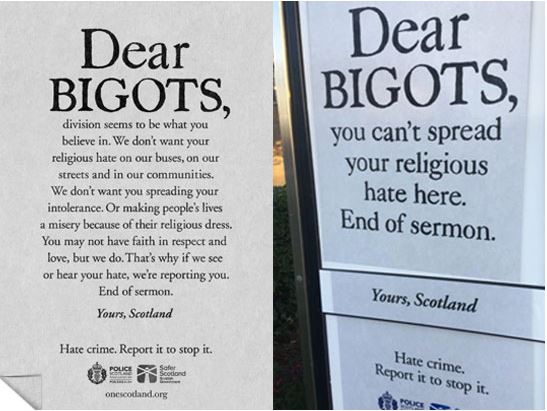 Related Articles
Related Articles
|
|
|
 Files
Files
|
|
|
|
|
Standing together: the imperative and the cost
A biblical injunction to support one another is easy to affirm verbally; but so often challenging to put into practice.
Recent background
 Back in November 2018 the Christian community in Scotland was shocked by ‘Hate Crime’ posters produced by the Scottish Government and endorsed by no less than Police Scotland and the Church of Scotland. The cleverly-designed posters were well stocked with very particular motifs and vocabulary which left little doubt that those of the Christian faith were/are the source of so-called hate speech and would suffer consequences for speaking out God's truths. Back in November 2018 the Christian community in Scotland was shocked by ‘Hate Crime’ posters produced by the Scottish Government and endorsed by no less than Police Scotland and the Church of Scotland. The cleverly-designed posters were well stocked with very particular motifs and vocabulary which left little doubt that those of the Christian faith were/are the source of so-called hate speech and would suffer consequences for speaking out God's truths.
In two significant meetings, church leaders drawn from across the denominational, political, organisational and professional spectrum some important observations were made: one of these being the need to “stand together”.
Present landscape
"I pray ....that they all may be one, as You, Father, are in Me, and I in You; that they also may be one in Us, that the world may believe that You sent Me."
John 17:21
|
The New Testament is replete with verses which call for Christian unity and mutual support. However if we were to examine the denominational map of the churches in Scotland we would find that at an organisational level at least the believers in Scotland are split across a vast range of groupings. Indeed even the first (Presbyterian) tradition which was birthed at the time of the 17th-century Reformation now shows a history of schism and fragmentation.
In all of these traditions develop and loyalties form which now serve to maintain the degrees of separation which divide the body of Christ in Scotland: so where to, in the midst, the aforementioned call to stand together?
The cost
 In the physical sense, ‘standing together’ means rubbing shoulders with those who normally circulate in different orbits. And any resultant discourse will soon reveal a number of different positions on a number of points on theology, practice or tradition. (The list is well known and requires no enumeration.) But in his high-priestly petition, Jesus prayed “that they may be one”. In the physical sense, ‘standing together’ means rubbing shoulders with those who normally circulate in different orbits. And any resultant discourse will soon reveal a number of different positions on a number of points on theology, practice or tradition. (The list is well known and requires no enumeration.) But in his high-priestly petition, Jesus prayed “that they may be one”.
But what all would agree is that Bible is the absolute ‘last word’, that Jesus Christ and the ‘Man who was God’ is the only means of salvation and that increasingly the Christian faith is under attack; in the public square, the workplace, academia and in much of the media in all its varied forms.
The call of Christ
Is it therefore time for each and every true disciple of Jesus Christ to examine where his or her loyalties, relationships and focus lies. There would be an inescapable cost of so doing; but, if this were to happen in any pragmatic fashion, then ‘standing together’ - in Christ - might translate from being merely aspirational to becoming manifestly real and meaningful?
All to the glory of God and His Kingdom. Might His will be done on earth as it is in heaven.
|
|
|
|